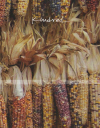Kindred – Fall 2013
Harvest time is my favorite time of year, so I was naturally drawn to this “Harvest” issue of Kindred. From the photographs to the stories and poems to the how-to pieces in this issue, Kindred not only brings the harvest season to life on the page, but also accomplishes its goals of bringing the sense of home and togetherness, fusing two themes of harvest and community.
Harvest time is my favorite time of year, so I was naturally drawn to this “Harvest” issue of Kindred. From the photographs to the stories and poems to the how-to pieces in this issue, Kindred not only brings the harvest season to life on the page, but also accomplishes its goals of bringing the sense of home and togetherness, fusing two themes of harvest and community.
The piece “Brought to You by Anonymous” by Noah Milligan brings this sense out in an unusual way. This short fiction takes a very subtle futuristic story line; if it wasn’t for one law the world has, it could easily take place in 2013. The characters in this story are not allowed to mow their own lawns, and over the course of events, end up living in suburban jungles with run-down cities. The protagonist, an eleven-year-old, socially awkward girl, takes on an almost vigilante-type personae as she leads a group of other girls to illegally perform lawn services on the city by night. The only low point of this story is the out-of-tune parents. Anyone who has ever suffered teen angst of any kind will appreciate those moments.
Probably my favorite piece in this issue is “Four Bosc Pears” by Jenn Blair. The poem is rich in its language and descriptions of the four pears, creating a vibrant image that exceeds simply four pears sitting in a red bowl:
Four yellow bodies
in a cheery red bowl.
One has no stem.
Another wears a gash
like a sash. One’s complexion
was marred by a relentless
storm and branch. The
last has an uneven edge
from swelling cells sewing
up its sides all wrong.
The theme of harvest runs throughout several, if not most of the poems in this issue; however, its meaning changes from poem to poem. In some, it takes on the meaning of new birth, of childhood and possibilities. In Molly Sutton Kiefer’s “Post-Op,” the theme is more one of second chances as the speaker celebrates her father-in-law’s survival of liver cancer: “It’s the last days of summer, before sun / slits its long winter eye. Out back, my husband / grills liver, a gift to his father for survival.” My favorite lines in this poem, though, are not this unusual celebration of a son over his father’s illness, but the speaker’s own connection between the harvest of vegetables to the existence of human life: “I think of my son as a root vegetable: / how can I not, when all last winter / this was how his growth was measured?”
The photographs paired with particular pieces tie in nicely, as do the two how-to sections of the issue, “Utensil Wrap” and “Gather and Make, A Collective Art Project.” This issue will make you miss the colors, smells, and tastes of harvest once more.
[anchorandplumepress.com]





